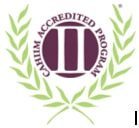Health Information Management
Associate of Science degree in Health Information Management trains students to function as entry-level Health Information Technicians ( HIT ) who can use a variety of information resources and technologies to ensure capture, quality, security, and access of healthcare data for the purpose of improving patient care and accomplishing the objectives of diverse healthcare environments. The program provides students with the knowledge and skills necessary to become self-directed learners who possess critical-thinking and problem-solving abilities as well as communication and interpersonal skills. It instills a commitment to life-long learning and important ethical values. The program fosters the acquisition of leadership abilities and systems thinking necessary for adapting careers within a changing healthcare environment.
The Associate Degree Health Information Management program at BSU, Fort Lauderdale campus, is accredited by the Commission on Accreditation for Health Informatics and Information Management Education (CAHIIM),.
Program Outcome
As reported on BSU 2014 CAHIIM Annual Program Assessment Report covering the 2012-2013 academic year, 100% of Health Information Management AS degree program graduates were employed within a year following graduation.
Program Objectives
The following objectives are designed to meet BSU mission and its goals:
- To develop students’ ability to ensure the quality of health records by verifying their completeness, accuracy, and proper entry into computer systems.
- To train students in the use of computer applications to analyze patient data for the purpose of improving patient care or controlling costs.
- To develop a student’s ability to think critically and communicate effectively.
- To train students in the use of the medical language and classification systems used to code diagnoses and procedures in patient records for continuity of care, healthcare reimbursement, and medical research.
- To prepare and assist graduates in obtaining entry-level employment in health information technology.
Prerequisites for Major Courses
- Background check and drug screening.
- Successful completion of the following courses with a cumulative grade average of 3.0 on a scale of 4.0: BSC2085C, BSC2086C, CGS1000, ENC1001.
- Completion of lower division general education courses with a minimum grade of “C” in each course.
Program Outline
To receive an Associate of Science degree in Health Information Management, students must earn 65.0 credit hours. Program requirements are as follows:
| Health Information Management Courses ( 39.0 credit hours total ) | |
| Medical Terminology | 3.0 credit hours |
| Introduction to Health Information Management and Healthcare Systems | 3.0 credit hours |
| Health Data Concepts and Systems | 3.0 credit hours |
| Legal Aspects of Health Information Management | 3.0 credit hours |
| Pharmacology for Health Information Management | 3.0 credit hours |
| Pathophysiology for Health Information Management | 3.0 credit hours |
| International Classification of Diseases Coding I | 3.0 credit hours |
| International Classification of Diseases Coding II | 3.0 credit hours |
| Current Procedural Terminology Coding | 3.0 credit hours |
| Health Insurance and Reimbursement | 3.0 credit hours |
| Healthcare Statistics and Research | 3.0 credit hours |
| Professional Practice Experience | 3.0 credit hours |
| Human Resouce Management | 3.0 credit hours |
General Education Courses ( 26.0 credit hours )




